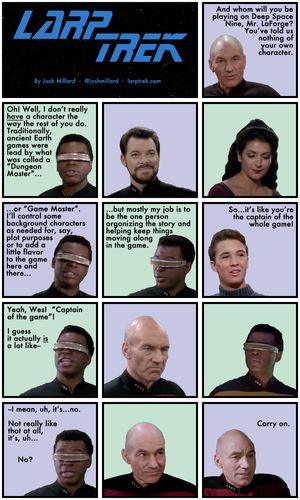#021 - pecking order more like holodecking order amirite

Easing into the actually-commencing-with-the-roleplaying phase of this whole thing (and it only took twenty strips to get there! When that’s the core premise! Concision, that’s what I’m into…) and I think it’s inevitable that some of these next strips will be RPG basics disguised as Star Trek jokes more than they’re Star Trek jokes disguised as RPG setup.
Which if you aren’t particularly familiar with the structure of role-playing games might actually be handy? I don’t know! It could be educational. This might be worth college credit. I am willing to write your school registrar a letter of reference, just let me know.
But, yes, this goes back to that thought the other day in strip #15 about Picard and not liking to share, and I think not liking to share esteem or social standing is part of that. He fought his way up to Captain, dammit, earned every bloody inch of it, and no Engineer with a fancy dancy eyepatch gets to take shortcuts there.
And of course Picard wouldn’t drop petty shit like this on the actual show. And, look, Next Generation is an artifact unto itself, and provides the context for all the Star Trek stuff that has come since (and a cultural context against which other modern space serials are contrasted as well), so I wouldn’t really want to see it changed even if I had a magic wand or a favor to cash in with the Q Continuum. It is what it is, and that’s sort of historically important.
But there are times when I fantasize a little about some of that interpersonal conflict that showed up on Deep Space Nine (or other series like, notably, the new Battlestar Galactica) finding its way into TNG; a little more edge to the way the crew interacts could have been pretty interesting, and could have opened up some more possibilities for the show in terms of character development and the meaty territory of opposing desires held in tension by the demands of duty and career, of friendship vs. ambition vs. self-preservation.
Conflict on Next Generation is almost always the crew or a crew member against some externality (Riker’s ambition for his own command vs. his love of serving under Picard on the Enterprise; Worf’s desire to embrace his Klingon heritage vs. his sense of obligation and duty to Starfleet; Wes’ desire to locate the galaxy’s ugliest sweater vs. his eagerness to please Picard and fit in with the crew…) rather than being between members of the crew themselves, and even the rare interpersonal conflicts that do arise between major cast-members are routinely neatly resolved by the end of the episode and we’re back to status quo. It preempts a lot of potential interesting character friction that, if TNG were being made new today, I think writers and directors would likely want to take serious advantage of. But they’re not making it today, and it is what it is, and that’s okay too.
tk
It's interesting rereading my thoughts from 2012, a decade-plus later, because we've had a whole new chunk of Star Trek since then and it has played with some of the things I was talking about, and it's been really hit and miss. There's changes I've been glad to see various shows try out, and a lot of stuff that feels a little like there wasn't really a plan for why this change was being made so much as just a desire to conspiciously make a change and buck the old franchise status quo.
I found myself starting to write capsule reviews of Discovery, Strange New Worlds, and (blech) Picard, but maybe that's a blog entry of its own at some point. Let's leave it at: I'm glad Trek has tried new things; I would like for them to maybe try harder and more often to remember the which of the old things also worked and do more of that too; and Lower Decks is a loving, perfect masterpiece of a comedy Trek show and I would likely have never made this strip if it had already existed because how do you follow that?